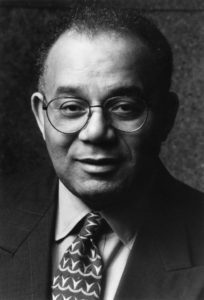
Robert Curvin (February 23, 1934 – September 30, 2015) was born in Newark and grew up in Belleville before attending Rutgers University where he earned a Bachelor’s degree in 1960 and his MSW in 1967. He went on to receive a PhD in political science from Princeton University in 1975. A distinguished alum, a scholar, a staunch friend of Rutgers University-Newark and a loyal son of Newark, a city he loved without reservation. Bob was recognized as a civil rights leader and world-renowned expert on urban politics, economic development and social policy, as well as for his advocacy skills in breaking down the barriers of discrimination. A leader in the Congress of Racial Equality (CORE) who served as Newark chapter head and national vice-chair, Dr. Curvin played a key role during the civil rebellion in Newark in 1967, articulating the platform of grievances that changed the landscape of decision-makers overseeing resources in the city and those holding political positions affecting the quality of life of its residents. While a member of the editorial board of The New York Times from 1978–84, he brought national attention to issues of social justice, equality and homelessness. He was an author, a founder of Newark’s New Community Corporation (one of the first of its kind). He devoted 12 years to the Ford Foundation before becoming president of the Greentree Foundation, a trust established by the late Mrs. John Hay Whitney to adapt the Whitneys’ 400-acre Long Island estate into a retreat center for the United Nations and other international organizations. A former dean of the Milano School of Management and Urban Policy at New School University and a past director of the Revson Foundation, Dr. Curvin was a trustee of the Fund for the City of New York, the Victoria Foundation, Beth Israel Hospital in Newark, New Jersey Performing Arts Center (NJPAC), Thirteen/WNET and Princeton University. He is the author of Inside Newark: Decline, Rebellion and the Search for Transformation.
